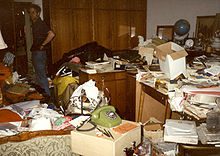 I’m a huge fan of Wall Street Journal columnist Melinda Beck. I follow her insightful “Health Journal,” and was especially intrigued by her two-part series on hoarding: how to help the hoarder and how to deal with it as a family member or friend. Beck’s perspective is unique because she combines her journalism skills with her life experience of dealing with her brother’s hoarding, and the crash course she got while helping him move in 2009, due to a foreclosure of his house.
I’m a huge fan of Wall Street Journal columnist Melinda Beck. I follow her insightful “Health Journal,” and was especially intrigued by her two-part series on hoarding: how to help the hoarder and how to deal with it as a family member or friend. Beck’s perspective is unique because she combines her journalism skills with her life experience of dealing with her brother’s hoarding, and the crash course she got while helping him move in 2009, due to a foreclosure of his house.
“We filled up five driveway-sized dumpsters with garbage and moved the stuff he would part with to two big storage units and a new apartment—all in five days,” she explained to me. “I was desperate to understand why he was doing this and how I could help so I read everything I could about hoarding.” In her research, she discovered the large population that is affected by hoarding and decided to write about it in her column. She did not disclose her brother’s hoarding at the time the pieces were published; however, since his death last year, at the tender age of 58, she is doing what she can to educate the public on this health issue.
I have the privilege of conducting an exclusive interview with her on this important topic.
1. Can you go over the difference between hoarding and collecting? You say in your article that “collectors are discerning and display their treasures proudly; clutterers and chronically disorganized people are willing and able to clean up and welcome assistance. Hoarders often strenuously resist help and turn a blind eye to the chaos.” I ask this because I would define myself as a collector: I love books, magazine, all sources of information; however, my husband (somewhat jokingly, somewhat not) calls me an information hoarder. I do resist. I know that. But I’m also not like the folks on “Hoarders” or “Oprah.” Are there any lines that can be drawn?
Melinda: I think there’s a spectrum of behavior when it comes to saving stuff. At one end are people who have messy desks and closets and never get around to cleaning them (guilty, guilty and guilty). At the other end are the serious hoarders who have a sea of stuff spilling over every surface and every corner and can’t walk through their homes. That’s where experts draw the line, by the way: when you can no longer use rooms for their intended purpose or reach exits because of the clutter, that’s hoarding. I also think letting rotten food pile up goes over the line. What makes some people move from just messy to the more serious problem, I don’t know … there’s some break with reality, some emptiness they are trying to fill. But the situation gets worse so gradually that family members don’t speak up until it’s really out of hand.
Collecting is tangled up in there too. I think a lot of hoarders think that’s what they’re doing or rationalize it that way. My brother had dozens of candles in glass jars and piles of books on locomotives and fighter planes that he’d never opened and probably 150 large knives, which really scared me. He said he was collecting them, but it seemed more like an excuse to amass things.
As for saving books and magazines and newspapers, I think that’s a sign of high intelligence and curiosity. ? But if they’re piled up all over the house and posing a fire hazard, that’s might be problematic.
2. Why do people hoard?
Melinda: That’s the question that haunts me and fascinates me at the same time. I found something called “107 Reasons Why,” on a Web site called Understanding Hoarding. A lot of the reasons are written by hoarders themselves. Most of the reasons are submitted by hoarders themselves and they say things like: “Maybe I’m hiding from life behind all this chaos & clutter” and “People can walk out of your life…things don’t” and “I don’t want to know that I CAN’T improve my life, and I’m afraid of finding out. So by not trying, I will never have to know.”
A lot of people can’t articulate it, but you can find some clues in the kinds of things they hoard. Some people are terrified of change and are trying to hold onto all the trappings of past lives or loved ones or visions of themselves they prefer to what they’ve become. My brother had most of the contents of our (deceased) parents’ much-bigger house crammed into his, along with stuff he’d amassed on his own.
Some people also get caught up in thinking that things have feelings and will be sad if they’re thrown away. It’s creepy, I know, but I catch myself thinking that way sometimes… If I had some setbacks in my life, it might not take much to send me into this kind of behavior… I think a lot of people who have hoarders in their families have that secret fear.
3. Animals. I don’t understand why some people hoard cats or dogs or bunnies. The whole thing freaks me out a little. Is this a separate kind of illness than, say, stacking up your newspapers in the bathroom? Why animals?
Melinda: I think people hoard animals out of loneliness or because they need to be needed. I’ve heard that animal hoarders genuinely think they are providing good homes for these cats or dogs or birds or whatever, and it gives them a purpose in life they might otherwise lack. But like other forms of hoarding, it gets out of hand and they turn a blind eye to the smell and the squalor and that pushes them further and further from reality.
4. I know that many professionals say that cleaning out a hoarder’s house feels like a violation to the hoarder and does little to help the cycle. But what if the mess is literally a health hazard? I know a woman who was caught between her bed and dresser and social services had to come in and rescue her. Doesn’t the family have a right, at that point, to intervene?
Melinda: Speaking as a family member and not a psychologist, I’d say yes, I think family has a right to intervene then – or even sooner if other people are living in the same house with the hoarder.
After I wrote that first hoarding column, I got a lot of mail of readers who had grown up with hoarding parents and said their lives were miserable. They could never invite friends over. They never knew if there would be laundry or food or a place to even sit and eat it. I also heard about elderly spouses of hoarders with no place to sleep or unable to maneuver a walker through the mess.
My heart goes out to hoarders. But it is simply not fair to force other people to live that way too, particularly if it’s gotten to be dangerous. And I think the sooner somebody intervenes, the better.
5. You mention a few ways that family members and friends can help a hoarder: by hiring a professional organizer, and by helping the hoarder to learn how to prioritize her stuff. But what if the person resists any help and continuously repeats the cycle. What does the family (or friends) do then? Can you mention a few things that the family and friends can do to help?
Melinda: There are no easy answers to this, which is why so many families of hoarders give up trying to change them. Some experts advocate “harm reduction” – just making sure the papers aren’t piled in front of the space heater and there’s a path to the door and the bathroom is useable. If you can get the hoarder to accept the need for that and throw away a few things, they may realize that it’s not so traumatizing and it might be a wedge to go further. You might try cleaning out just one room and seeing how that goes.
In some ways, being forced to move out quickly like my brother was can be a blessing. You can blame the bank or the sheriff — it’s not the sensible family against the nut case. It’s true that people often start hoarding again in a new setting, but at least it will take awhile to build up to a dangerous level again.
Working on the underlying emotional issues may be the best approach. Antidepressants might numb the pain enough to let them realize that the clutter isn’t serving the purpose they want it to. I really love the advice to create “shrines” or memory boxes if they are still grieving for lost loved ones or lost parts of themselves, with a few important things they can focus on, rather than a big disorganized pile. If you can honor the emotion they’re feeling, rather than denying it, they might be more willing to cooperate.
And if feeling abandoned or lonely or purposeless is fueling this behavior, see if you can find something else for them to do to fill up that emptiness—even if it’s volunteer job. I didn’t have the chance to try that with my brother, but if I had it to do over again, that’s what I’d try.

